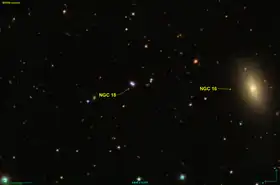NGC 18
NGC 18 is a double star system located in the constellation of Pegasus.[1] It was first recorded by Herman Schultz on 15 October 1866. It was looked for but not found by Édouard Stephan on 2 October 1882. It was independently observed by Guillaume Bigourdan in November 1886.[1]
 | |
| Observation data Epoch J2000 Equinox J2000 | |
|---|---|
| Constellation | Pegasus[1] |
| Right ascension | 00h 09m 23s[1] |
| Declination | +27° 43′ 56″[1] |
| Apparent magnitude (V) | 14[1] |
| Other designations | |
| Database references | |
| SIMBAD | Pul-3 10207 |
| Pul-3 10208 | |
Both stars are 2528±20 light-years away, and based on this distance have a minimum separation of approximately 2,700 astronomical units, an unusually wide separation for a binary system.
References
- Seligman, Courtney (March 2010). "NGC Objects: NGC 1 - 49". Celestial Atlas. Retrieved 27 October 2010.
- "Pul-3 10207". SIMBAD. Centre de données astronomiques de Strasbourg. Retrieved 31 January 2018.
- "Pul-3 10208". SIMBAD. Centre de données astronomiques de Strasbourg. Retrieved 31 January 2018.
External links
 Media related to NGC 18 at Wikimedia Commons
Media related to NGC 18 at Wikimedia Commons
This article is issued from Wikipedia. The text is licensed under Creative Commons - Attribution - Sharealike. Additional terms may apply for the media files.